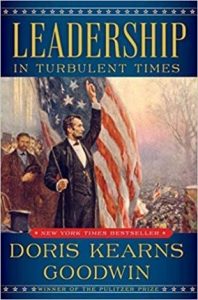By Elliott Brack, republished with permission | It’s fun to read books by Doris Kearns Goodwin. Here’s why: the author writes intelligently, figuring that the readers know basic facts about the overall book subject. So, she cuts to the quick, giving you new insights and facts about the stories you already know. You don’t waste time hearing her version of what you already knew.
 Her most recent book is Leadership in Turbulent Times, concentrating on the key turning points of the tenure of four presidents: Lincoln, both Roosevelts, and Lyndon Johnson.
Her most recent book is Leadership in Turbulent Times, concentrating on the key turning points of the tenure of four presidents: Lincoln, both Roosevelts, and Lyndon Johnson.
Her insight particularly of not why, but how, these four presidents made monumental decisions, is the key takeaway from this recent book of hers. Each of these four great presidents had to search hard for how they could take action in a crisis. All four were wary of taking extra-ordinary action when precedents had not been set before. Each sought legal means, often delicate points to move when our country faced a difficult crisis.
Ms. Goodwin’s book offers a sharp contrast to the manner that current President Donald Trump has taken in delicate situations, while often circumventing previous protocols and policies.
One situation Theodore Roosevelt found the nation in soon after taking office was a far-reaching anthracite coal strike. It lasted more than six months. As the year moved closer to winter, stores of coal were running seriously low, meaning that people especially in the Northeast, heavily dependent on coal, would suffer without heat in winter.
Meanwhile, Teddy Roosevelt was concerned about the rampant consolidation of corporate wealth, as a result of the Industrial Revolution. Roosevelt felt that its speed and size “accentuates the need of the Government to have some power of supervision and regulation over such corporations.” Eventually, he found a way to bring the two sides together, and eventually solved the strike, and kept people in the Northeast warm. But he made sure that he took only legal means to make this happen.
 Roosevelt understood that only the government itself could bring the two sides to the table. That was something new for this country, that is, the government taking such leads to solve problems that neither big business and labor wanted the government to step in on. But, Roosevelt knew that the two sides would have taken such steps. Eventually, this led to the government becoming involved and Roosevelt’s “trust busting” of Standard Oil, and other corporations and monopolies that held our nation in a stranglehold for essential goods and services.
Roosevelt understood that only the government itself could bring the two sides to the table. That was something new for this country, that is, the government taking such leads to solve problems that neither big business and labor wanted the government to step in on. But, Roosevelt knew that the two sides would have taken such steps. Eventually, this led to the government becoming involved and Roosevelt’s “trust busting” of Standard Oil, and other corporations and monopolies that held our nation in a stranglehold for essential goods and services.
This step that Theodore Roosevelt started can bring us to the modern times. Today we are not threatened by Standard Oil monopolizing the energy market. Today we see information technology companies like Amazon, Google, Microsoft, Facebook and other modern services, gaining more and more of a stranglehold on our information. Do they need breaking up?
Meanwhile, financial institutions are even more massive than ever before. Do we need to wake up and insist that the banks have better controls, and not be so big?
So the question: is it time for our government to become more aggressive against these private companies and more on the side of the individual, since these modern entities amass more power and dominate their fields and seem to grow even larger each day? Are they gaining too much power?
Sadly, it appears that no one on the horizon has stepped forward to curtail the power of today’s high-tech companies, Big Banks, or any other industry that is becoming humongous in many fields.
Is bigger better? Perhaps Doris Kearns Goodwin might tackle that subject next.
Veteran Georgia newspaperman Elliott Brack is editor and publisher of GwinnettForum.com, where this commentary first appeared.
- Have a comment? Send to: feedback@statehouse report.com


